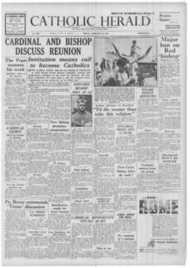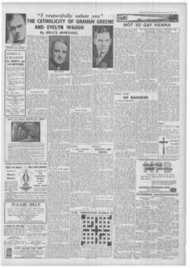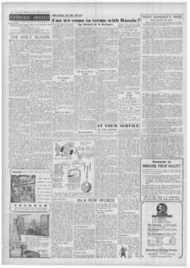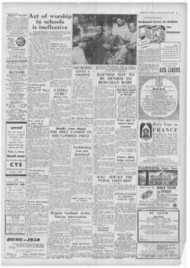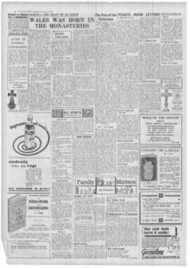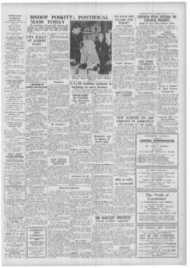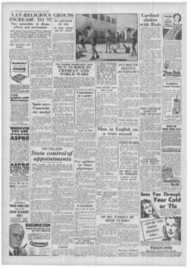Page 3, 24th February 1950
Page 3

Report an error
Noticed an error on this page?If you've noticed an error in this article please click here to report it.
Tags
Share
Related articles
The Greene Scene
Leading Novelist Gives Lecture
What Is A Catholic Novel?
Nostalgic Trip With Graham Greene
Secret Letters Of Catholic Author Go Under Hammer
"I respectfully salute you
THE CATHOLICITY OF GRAHAM GREENE AND EVELYN WAUGH
By BRUCE MARSHALL
NINETEEN odd years ago when
Graham Greene published his first novel, The Man Within, his publishers, Messrs. William Heinemann, brought out almost simultaneously, a novel by Lorna Rea called Six Mrs. Greenes. A critic, whose name I have for, gotten, wrote that he wished that Messrs. Heinemann could give us also six Mister Greenes. Messrs. Hzinemann have. unfortunately, Iscen unable to fulfil this critic's wish. Instead Messrs. Chapman and Hall have given us one Mr. Evelyn Waugh. Which leaves us with four still out of the bag and for a long time, I think.
Graham Greene and Evelyn Waugh have in common the excellence of their art and their belief in traditional Christianity. They also share the virtue that their orthodoxy does not blind them to the fact that there is precious little orthodoxy either of belief or of conduct left in the world today, and neither of them perfumes reality to accommodate the nostrils of those who would like to pretend that the Kingdom of God has already been established in Port Said. Apart from that they are both different kinds of novelists, which is not astonishing, since good novelists are always original. Their similarity is that they are both convert Catholics sensitively portraying the not too lovely accidents of the late Mr. H. G. Wells dream world come true. This combination of faith and perception has surprised secular critics.
A necessary task The difference between Greene and Waugh becomes apparent when we try to imagine one of them having written the other's novels. It is as difficult to think of Greene as the author of Decline and Fall as it is to think of Waugh as the author of Brighton Rork. Greene is the chronicler of the grimness of grimness without grace, and Waugh is the chronicler of the grimness of gaiety without grace.
Greene sees and portrays the ugliness of a world which no longer even knows what it has fallen from, and sometimes makes even that ugliness seem beautiful because of the author's knowledge of the loveliness of which it is the terrible reverse.
Waugh, except perhaps in The Loved One. shows the essential dullness of those dreadful bright young things who imagined that they had invented alcohol, agnosticism, free verse, zipp fasteners and sin.
Both novelists have been charged by clergymen with writing " unnecessandy" about ugly or futile people.
The injustice of this charge may be realised when we consider the writers who were fashionable before the advent of Greene and Waugh and also when we contemplate their con
temporaries. Galsworthy, Bennett and Wells all wrote about people unlikely to be invited to tea by protonotaries-apostolic, and yet their novels were to be found in the drawing-rooms of most deaneries and event peripatetic Redemptorist missionaries read them on railway journeys. The Forsyte Saga was largely the not altogether unapproving chronicle of a disintegrating Christianity and it contained the portrait of an Anglican clergyman whose fatuous doctrineless doctrines were much more dangerous than illustrated pornography. Perhaps it was because of the suspicion that he wrote literature and was therefore unlikely to be read by Catholics that Galsworthy escaped being bracketed in sermons with holding hands in cinemas and leaving church before the end of the last gospel. And why never a stone at Toro Surigay, which preached the preposterous lie that the modern aeroplane would be the harbinger of progress, plenty and ieisure ?
But let me not be misunderstood: Galsworthy and 'Bennett were great and sensitive writers and at the time Catholics could produce no novelists to compare with them. There were good Catholic novelists writing, of course, but few, if any, of them ever got down to the hard job of showing the Church of God at work among recalcitrant humanity.
Chesterton. for example, never made the sin smell as real as the virtue, perhaps because he wasn't brought up in the same shattered world as Greene and Waugh.
But Greene and Waugh never made the mistake their contemporaries made of loving the bad smell for the bad smell's sake. Both learned to speak the language of the moderns without imbibing their errors. It is because of their knowledge of the language and because they are as good writers as the agnostics that they are read so eagerly by those who do not understand that Catholicism is something more than another way of singing Abide With Me.
The heart of the matter Although Greene is generally a grim writer and Waugh is ordinarily a gay writer, there is never the cold Greene as there is sometimes the cold Waugh. (Of course, to make a pun which is doubly unpardonable for a Scot. the cold Waugh is really the cold war against the stupidity of frivolous behaviour.) I don't like to talk about novelists having a " message," and I am pretty sure that Mr. Greene doesn't either, but you can't read Greene's books without being struck by the author's insistence on the necessity for pity and on the hope for mercy. Brighton Rock, The Power and the Glory, and The Heart of the Matter are all clement novels. What the old priest says about Peguy to Rose in the confessional is not, in substance, so very different from what Father Rank says to Mrs. Scobie after the suicide of her husband. The whole point of The Power and the Glory is the contention that the apparently broken vessel often holds more grace than the evidently whole one.
For Greene, and almost certainly for theologians too. the heart of the matter is God's knowing what goes on in the human heart. And Greene himself comes very near to possessing the heart of the matter.
I know of no other writer living who so accurately knows what goes on in the hearts of human beings, be they crooks, half-educated young girls or priests. And to this excellence he adds another:. that of knowing what is NOT going on in the hearts of his characters. The shallowness of the unfortunately representative Freddy Bagster becomes almost profound because of Graham Greene's knowledge of what is not going on in his heart.
The warm Greene shares with the cold Waugh the knowledge of what goes on in the hearts and minds of clergymen. This is astonishing when we consider that, with the exception of such writers as Compton Mackenzie and the late Robert Hugh Benson, it is quite a long time since writers took the trouble to find out what goes on in the minds of clergymen.
Stendhal, for example, was completely clueless on clergymen and 1, for one, find it hard to believe that, in an age of theological controversy. Trollope's Archdeacon Grandy and Reverends Harding and Arabin could have had so dim a perception of even the dim doctrines they were required to preach. Mr. H. G. Wells had a shot at it in 1917 in The Soul of a Bishop, but, as somebody said at the time, what he showed the public was only the soul of Mr. Wells in the body of a bishop. And more recently that excellent novelist Mr. Nigel Balchin, who knows all about what goes on in the back rooms of scientists, has shown that, howeve, detailed his knowledge of history, he does not know what went on in the back minds of even Borgias.
Mr. Greene has proved in a whole novel about one bad priest that he knows how all bishops, priests and deacons think ; and Mr. Evelyn Waugh, in a few deft paragraphs in Brideshead Revisited, has shown that he knows the same thing. Both are artistic feats which find their parallel only in the portraits of quite different clergymen by Francois Mauriac and the late Georges eternanos.
I imagine that Graham Greene is more aware than Evelyn Waugh of the unhappiness that there is in the world. Greene knows that bibbing and wenching are not the only sins, and that cruelty is the worst sin of all. It is this perception, and not only his language and characterisation, which distinguishes his accounts of crime from those of the Oppenheims and Wallaces.
Aldous Huxley, if I remember correctly, once said that the difference between War and Peace and The Rosary was that Tolstoy had first rate feeling apparatus and Miss Florence Barclay a seventeenth rate one.
Greene has both a first rate feeling apparatus and a first rate transmitting apparatus. But if No Orchids for Miss Blandish is had Hemingway, Brighton Rock is something more than good Oppenheim. Brighton Rock would he good Oppenheim if Mr. Greene confined himself to drawing character and writing English better than the late Mr. Oppenheim and to respecting probabilities. Brighton Rock is great Oppenheim because Mr. Greene knows of an improbability whose poss:bility Mr. Oppenheim never knew existed: that the desire to obey "the appalling demands " of God can exist in the heart of a tarted up little waitress.
Evelyn Waugh I suppose that it was not until Mr. Evelyn Waugh published The Life of Edmund Campion that it became apparent to fashionable young women in bars that in Decline and Fall and Vile Bodies Mr. Waugh had been satirising rather than approving their philosophy. If the Scots are slow to appreciate the humour in an apparently serious statement, the English are even slower at appreciating the seriousness that may lie behind an apparently humorous statement.
Mr. Waugh seems to have distrusted their ability to apprehend the seriousness in even a serious statement, because he prefaced Brideshead Revisited with the warning that it was "not meant to he funny." I wonder what the yapping young women made of that. I know of at least two of them who read Brideshead Revisited as though it were another version of the intelligently
amusing. but quite unmetaphysical, gambols of Miss Nancy Mitford.
The buffoonery was there. of course, as Waugh himself admitted, but. just as Greene's treatment of crime includes the very real sadness beyond the crime, so does Mr. Waugh's treatment of buffoonery include the very-real sadness beyond the but f °orrery.
Brideshead Revisited is historically, sociologically, artistically and theologically correct. Just think of all the things the author got right: Oxford (Mr. Christopher Sykes vouches for that), the Army, night clubs, young men about town, convent-educated girls, frivolous young women and Catholic priests. Hooper and the Colonel are as accurate as Cordelia and Father
Mackay. Rex is as authentic as Anthony Blanche. 'I he military prologue and epilogue are the real army thing just as the deathbed reconciliation of Lord Marchmain is
the real ecclesiastical thing. Like The Forsyte Saga, Brideshead Revisited is the picture of an age, but no picture of an age can be quite true unless the glow of eternity, or whatever you like to call it, is allowed to shine upon the billiard cue or the cocktail glass. I don't think that John Galsworthy quite understood this ; Evelyn Waugh does, But it is not only because of their superiority to ft; majority of their contemporaries I like the work of Mr. Graham Greene and Mr. Evelyn Waugh. It is also because Mr. Graham Greene and Mr. Evelyn Waugh make me want to be holy, while the writers of the holy books so often make me want to commit bigamy, become a communist or steal a jet aeroplane.
J. K. Huysmans knew the reason for this and I hope that you do too, but, in case you don't, I'll tell you; Graham Greene and Evelyn Waugh make me want to be holy because they write good English, draw character accurately and present a whole world for me to read about ; and that is why I very respectfully salute them.
blog comments powered by Disqus


